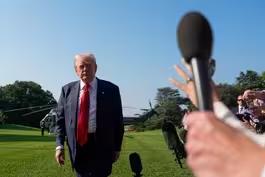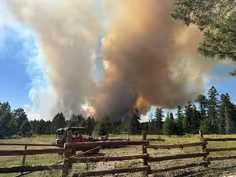
EPA to overturn finding used to regulate carbon emissions
Clip: 7/29/2025 | 7m 49sVideo has Closed Captions
EPA plans to overturn scientific finding used to regulate carbon emissions
The EPA announced plans to overturn a key scientific finding that has been used to regulate carbon emissions since 2009. The endangerment finding determined that pollutants caused by burning fossil fuels endanger humans and can be regulated under the Clean Air Act. It’s the latest in the Trump administration’s efforts to roll back federal regulations. Stephanie Sy discussed more with Ben Geman.
Problems playing video? | Closed Captioning Feedback
Problems playing video? | Closed Captioning Feedback
Major corporate funding for the PBS News Hour is provided by BDO, BNSF, Consumer Cellular, American Cruise Lines, and Raymond James. Funding for the PBS NewsHour Weekend is provided by...

EPA to overturn finding used to regulate carbon emissions
Clip: 7/29/2025 | 7m 49sVideo has Closed Captions
The EPA announced plans to overturn a key scientific finding that has been used to regulate carbon emissions since 2009. The endangerment finding determined that pollutants caused by burning fossil fuels endanger humans and can be regulated under the Clean Air Act. It’s the latest in the Trump administration’s efforts to roll back federal regulations. Stephanie Sy discussed more with Ben Geman.
Problems playing video? | Closed Captioning Feedback
How to Watch PBS News Hour
PBS News Hour is available to stream on pbs.org and the free PBS App, available on iPhone, Apple TV, Android TV, Android smartphones, Amazon Fire TV, Amazon Fire Tablet, Roku, Samsung Smart TV, and Vizio.
Providing Support for PBS.org
Learn Moreabout PBS online sponsorshipGEOFF BENNETT: The EPA announced plans today to overturn a key scientific finding that it has used to regulate carbon emissions and climate pollution since 2009.
AMNA NAWAZ: It's the latest in the Trump administration's efforts to roll back federal regulations, and, if upheld, could undo Obama and Biden era climate policies.
Stephanie Sy joins us with more.
STEPHANIE SY: Amna, the EPA is specifically targeting the endangerment finding, which determined that pollutants caused by burning fossil fuels endanger humans and can therefore be regulated under the Clean Air Act.
It's been the basis for the government's fight against climate change for the last 15 years.
During an appearance at a truck dealership in Indiana, EPA Administrator Lee Zeldin accused previous administrations of twisting the Clean Air Act, resulting in what he said were more than a trillion dollars in regulations over the years.
He said President Trump was given a mandate to change that.
LEE ZELDIN, Environmental Protection Agency Administrator: They elected President Trump president of the United States.
That was the will of the American public.
And when they voted, they asked for, demanded that an agency like the EPA would be cognizant of their economic concerns, that all agencies would be applying common sense, that we at EPA must choose to both protect the environment and grow the economy, that it's not a binary choice.
STEPHANIE SY: Joining me now for more on what this means and how it will affect current regulations, I'm joined by Ben Geman, energy reporter for Axios.
Ben, thank you for joining the "News Hour."
So, first off, can the EPA do this, just rescind the entire legal basis for regulating emissions?
BEN GEMAN, Axios: They can certainly try.
Now, this is a proposal that went out today.
If and when it is finalized, it will certainly be subject to very vigorous legal challenges.
But, yes, in theory, this is something that they can attempt to do.
And it's a very bold and aggressive step, because what we're seeing right now is the most stark example of the Trump administration seeking to sort of rip out its Democratic predecessor's climate change policies really just root and branch.
And I think it's also important to sort of see this on a continuum, right?
It's part of a broader suite of efforts.
Now, what this would do is, as you mentioned in the beginning of the segment, essentially overturn the legal underpinnings of regulating greenhouse gas emissions under the Clean Air Act.
Real quick, a 2007 Supreme Court decision said that these emissions are -- can be considered pollutants, and if EPA makes a finding that they endanger human health and welfare, then EPA can go ahead and start to regulate these emissions.
This was directly about tailpipes, but, by extension, it's about power plants, refineries, and other types of large sources of emissions.
So what they're doing with this decision is essentially sort of trying to, in one kind of fell swoop, essentially knock out the pillars that hold up different types of regulations.
Now, I should say they're also repealing other regulations in a sort of piece-by-piece way.
So -- but this is -- like I said before, this is sort of perhaps the most direct assault, I would say.
STEPHANIE SY: OK, so there's a public comment period open now.
And then what?
How much could this roll back greenhouse gas regulations?
And what would the impact of that be, including on future attempts to regulate emissions?
BEN GEMAN: Yes, I think the last thing you said there is the most important, because this administration is already walking away from Biden and Obama era efforts to regulate emissions from cars, trucks, power plants, and so forth.
But if you remove the legal underpinning of the sort of whole endeavor, that would make it extremely cumbersome and difficult for a future administration that did want to take action on these sources to sort of reimpose those regulations, because this legal sort of bedrock for those actions would no longer be in place.
Now, I do think it's important to note that regulations are hardly the entire ball game when you sort of look at policies that aim to limit use of green -- or limit the emission of heat-trapping emissions in the U.S. and increase the uptake of cleaner-burning types of energy, whether that's electric vehicles or solar power or other types of renewables.
Now, the Biden administration had been trying to sort of aggressively create policies on, I suppose you could say, the demand side, which were these large consumer and business subsidies in the Inflation Reduction Act for using these cleaner types of sources.
So I think, if you look at this together with -- if you look at this rescission of the endangerment finding together with these other policies, it would make it more difficult for the U.S. to continue cutting emissions.
STEPHANIE SY: So, even if this change happens, Ben, market forces are still going to do what they're going to do and renewable energy industries may continue.
BEN GEMAN: That's absolutely right.
I mean, regulations are one of the factors that determine how quickly or how slowly we see this slow-moving transition away from fossil fuels.
But certainly there's a whole constellation of other reasons why utilities are bringing more wind and solar power online, why car companies are creating more electric vehicles and issuing more and more models.
I think what's safe to say is that, while it's very hard to predict the future of clean energy deployment, removing this finding would make it difficult to accelerate emissions reductions in the U.S. and would create new barriers to the rapid uptake of clean energy sources that are coming alongside other barriers that have already been showing up.
But, that said, you're absolutely right.
Markets will have a say and the energy transition will continue.
But what we're really talking about, I think, is the pace of that transition.
STEPHANIE SY: I do want to talk about the fact that, at today's event, there was a lot of talk about how costly these regulations have been.
Have the American people and whole sectors of the economy been collateral damage in the transition away from fossil fuels?
BEN GEMAN: Yes, I mean, this is a very complicated question because any regulation has both costs and benefits.
But those costs and benefits don't all accrue to the same people.
Now, what I would say is that, when you have seen the EPA under the Biden and Obama administrations issuing these types of Clean Air Act regulations, they do tend to find that, on balance, the benefits far outweigh the costs.
But, that said, the way that these regulatory impact analyses are constructed are subject to some, I suppose, kind of fiddling with the dials.
I do think it's interesting to start looking at the reasons that the EPA is giving for trying to remove this finding.
I mean, on the one hand, it is definitely the scientific consensus, and we should never shy away from that, that greenhouse gas emissions, primarily from burning fossil fuels, are causing dangerous climate change.
But the EPA makes a whole series of other arguments in this long document, such as the idea that the EPA in 2009 was overstating some of the harms.
They also get into the idea that the U.S. contribution to these emissions, particularly from tailpipes, is not going to be globally significant enough to justify some of the costs of imposing these regulations.
And then they get into some other arguments as well.
Their eyes are really on the Supreme Court, as are mine, because the Supreme Court has been issuing decisions in recent years that essentially pull back how much running room agencies have to impose new regulations unless Congress has sort of given them a very, very detailed and explicit blessing with which to do so.
STEPHANIE SY: Ben Geman, Axios' energy reporter.
Thank you so much for joining us, Ben.
BEN GEMAN: Thank you for having me on.
FCC commissioner says Trump's actions threaten press freedom
Video has Closed Captions
Clip: 7/29/2025 | 8m 17s | Trump's 'censorship and control' campaign threatens press freedom, FCC commissioner says (8m 17s)
Gaza seeing 'worst case' famine scenario, aid group warns
Video has Closed Captions
Clip: 7/29/2025 | 4m 52s | Gaza experiencing 'worst case' scenario of famine, leading aid group warns (4m 52s)
'Maybe Happy Ending' musical captivates Broadway audiences
Video has Closed Captions
Clip: 7/29/2025 | 7m 3s | 'Maybe Happy Ending' actor and composer on the musical that's captivating Broadway (7m 3s)
News Wrap: Gunman was targeting NFL, New York mayor says
Video has Closed Captions
Clip: 7/29/2025 | 5m 28s | News Wrap: Gunman was targeting NFL, New York mayor says (5m 28s)
Two senators on working across the aisle to combat wildfires
Video has Closed Captions
Clip: 7/29/2025 | 11m 14s | Senators highlight importance of working across the aisle in mission to fight wildfires (11m 14s)
Why 'manosphere' content is appealing to some young men
Video has Closed Captions
Clip: 7/29/2025 | 7m 53s | Why 'manosphere' content is appealing to some young men (7m 53s)
Providing Support for PBS.org
Learn Moreabout PBS online sponsorshipSupport for PBS provided by:
Major corporate funding for the PBS News Hour is provided by BDO, BNSF, Consumer Cellular, American Cruise Lines, and Raymond James. Funding for the PBS NewsHour Weekend is provided by...

















